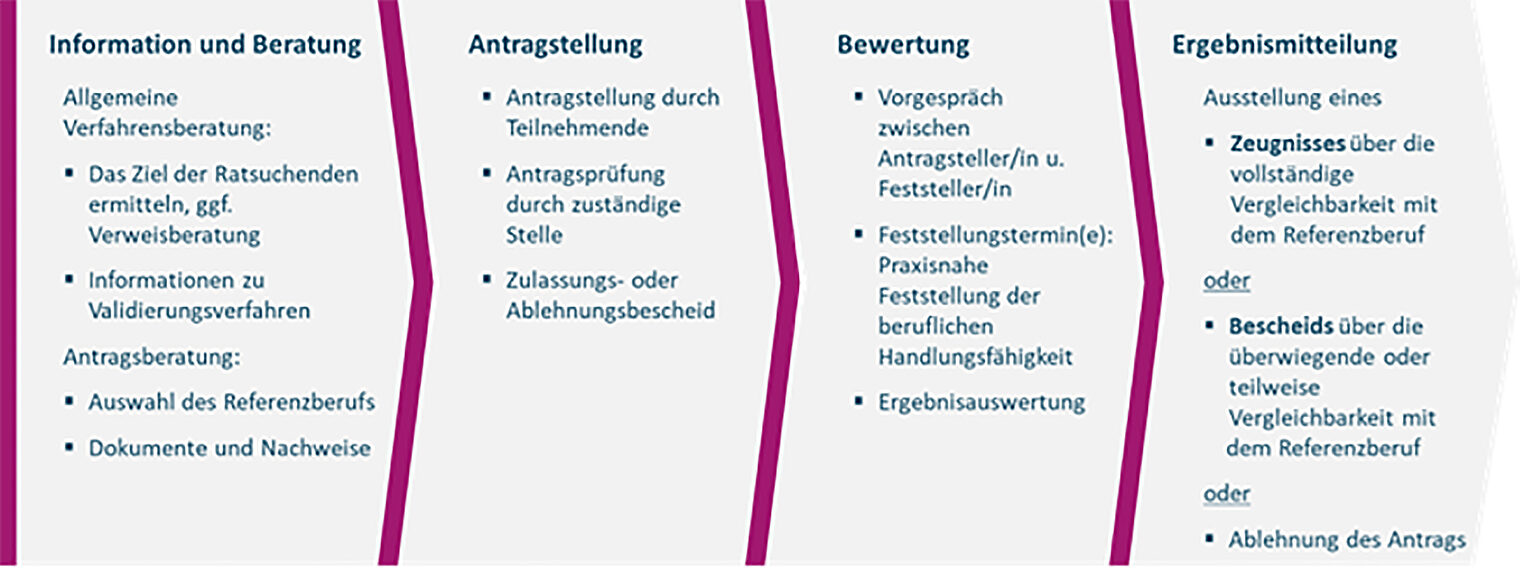Validation of extensive work experience
People without a formal vocational qualification in their field often face difficulties on the labour market. They lack officially recognised proof of their skills and knowledge. For example, if they become unemployed, this can be a serious problem because they are easily overlooked or underestimated on the labour market. Even changing jobs can be difficult without recognised proof of skills.

Determination and certification of an individual’s occupational competence based on the standards of a recognised training occupation
From 1 January 2025, occupational competence acquired outside formal vocational training but comparable to that in a recognised training occupation (reference occupation) will, for the first time, be assessed and certified. This helps individuals and businesses alike. This enables them to better assess the skills and abilities of people without a formal vocational qualification. This enables them to assign their employees more appropriately and provide targeted further training. For companies, the procedure can become a component of an overall strategy for securing skilled workers and strengthening employee retention. The Leipzig Chamber of Skilled Crafts is the responsible authority for individuals and businesses in the Leipzig chamber district. Please schedule an appointment for an initial consultation.
How much work experience is required to participate in a validation procedure?
Employees must have worked across a wide range of tasks within the company. Only those who have performed predominant parts of the occupational profile in the reference occupation are eligible for the procedure. To participate in a validation procedure, you must have relevant professional experience amounting to at least 1.5 times the standard training duration for the reference occupation.
Example: Vocational training lasts three years. To be assessed in this occupation, you must provide evidence of at least four and a half years of relevant work experience.
FAQs
The procedure has four steps.
- Information and advice
Interested individuals receive initial information about the procedure and the documents required to submit an application. In addition, the appropriate reference occupation can be identified. The reference occupation is part of the dual vocational training system (company-based and school-based).. - Application
Interested persons document their skills and competences based on their CV. The details must be supported by employment references, work records or certificates. The competent authority reviews the application and assesses the submitted documentation and evidence. - Assessment
An assessment panel consisting of two examiners determines occupational competence – primarily through practical and oral tasks – for the full occupational profile or its predominant parts. - Notification of Results
Depending on the outcome, the Chamber issues either a certificate of full comparability of occupational competence in the reference occupation or a notice of predominant comparability. If sufficient occupational competence cannot be established, the application will be rejected.

The entire procedure is carried out in German, so sufficient German language skills are required. This mainly concerns the technical terms used in the relevant occupation. If you are unsure, seek advice from your Chamber.
- Copy of an identity document (e. g. identity card or passport)
- Copy of proof of residence (e. g. identity card or residence permit)
- Details of work experience in the reference occupation (e. g. a current CV)
- Evidence of acquired occupational competence (e. g. employment references, continuing education and training certificates)
- If applicable, an application for reasonable accommodation (Nachteilsausgleich)
Documents issued in a language other than German must usually be submitted together with a translation.
The validation procedure is an official, fee-based service provided by the Leipzig Chamber of Skilled Crafts. The fees are set out in the Chamber’s schedule of charges. Separate fees apply for admission to the validation procedure and for the assessment of occupational competence:
- Fee for admission to the procedure (»application fee« – includes application submission and evaluation of application documents),
- Gebühr für die Bewertung der beruflichen Handlungsfähigkeit (»Bewertungsgebühr« unter anderem für Aufgabenerstellung, Bewertung durch das Feststellungstandem).
Additional material costs may apply. The Chamber can inform you about the fees applicable to your case.
The validation procedure ends with a certificate or a notice. The following outcomes are possible:
- Certificate of full comparability of occupational competence,
- Notice of predominant comparability of occupational competence,
- Notice rejecting the application if predominant comparability of occupational competence cannot be confirmed.
Special rules apply for people with disabilities. Please schedule an appointment for advice (see FAQ »Which special rules apply to people with disabilities?«).
Note: No vocational qualification is awarded. This is only granted to those who successfully pass a German journeyman’s examination or a final examination.
- Admission to sit the journeyman’s examination as an external candidate
- Admission to examinations at the first level of advanced vocational training (e. g. »Geprüfter Berufsspezialist«)
- Admission to the master craftsperson examination in crafts not requiring a licence
- Admission to the master craftsperson examination in crafts requiring a licence is only possible after one additional year of relevant work experience
- Authorisation to provide training in crafts not requiring a licence, provided that trainer aptitude (AEVO examination) is also demonstrated
Note: Even without validation, it may still be possible to be admitted as an external candidate to the journeyman’s or master craftsperson examination. Please contact HWK Leipzig for advice.
In addition, the validation result can be used directly on the labour market. However, the Vocational Education and Training Validation and Digitalisation Act (Berufsbildungsvalidierungs- und -digitalisierungsgesetz – BVaDiG) does not establish any wage entitlements. Whether a validation result is considered in wage setting is up to the collective bargaining parties or to individual businesses within their contractual freedom.
Additional rules apply for people with disabilities as defined in Section 2(1), first sentence of Book IX of the German Social Code (SGB IX).
- You can apply for reasonable accommodation if the health impairment affects the competence assessment.
- You can apply for procedural support.
If, due to the nature and severity of the disability, it is not possible to determine predominant or full occupational competence required for the reference occupation, an additional option is available:
- You may apply for a finding of partial comparability of occupational competence.
- The minimum age requirement of 25 years does not apply.
- The notice may also confirm the partial comparability of occupational competence.
The notice of partial comparability may also indicate predominant or full comparability with a reference training regulation pursuant to Section 42r of the Crafts and Trades Code (HwO), provided that the regulation is uniform across Germany.
The supplementary procedure focuses on determining the full comparability of occupational competence. An application for a supplementary procedure may be submitted only once. The notice of predominant comparability specifies in detail the areas in which occupational competence exists and those in which it does not. In the supplementary procedure, only the areas for which occupational competence was not previously established are assessed.
After a notice of rejection, you may submit a new application for a repeat of the procedure after a period of twelve months. You must credibly demonstrate that you have acquired new or additional occupational competence.
The reference occupation is the dual vocational training occupation in which occupational competence is to be assessed. The validation procedure is offered for all dual vocational training occupations for which the Leipzig Chamber of Skilled Crafts is responsible.
The initial consultation and the examination of the formal requirements are carried out by the Leipzig Chamber of Skilled Crafts (Handwerkskammer zu Leipzig). An assessment panel of two examiners determines occupational competence – mainly through practical and oral tasks—for the full occupational profile or for its predominant parts. The panel consists of two examiners trained specifically for the procedure. The basis for the assessment is the relevant training regulation for the occupation.
The overall duration depends, among other factors, on the individual circumstances, the scope of the application, and the occupation concerned. Depending on the occupation and the scope of the competences to be assessed, the practical assessment can take from one day to several days.
With the certificate or notice issued by the chambers, employers receive a reliable assessment of the occupational competence of employees or applicants who do not have a formal vocational qualification. This enables them to be assigned to suitable tasks or to receive targeted further training. This certificate or notice also signifies special recognition and can strengthen employee retention. Skilled employees can be retained in the company and motivated to continue developing. Thus, the validation procedure also helps to secure a skilled workforce.
Weiterführende Informationen
Crafts and Trades Code (Gesetz zur Ordnung des Handwerks – HwO)
Vocational Education and Training Validation and Digitalisation Act (Berufsbildungsvalidierungs- und -digitalisierungsgesetz – BVaDiG)
Ordinance on the procedure for determining and certifying individual occupational competence against the standard of a recognised training occupation pursuant to the Vocational Training Act (BBiG) and the Crafts and Trades Code (HwO) (Berufsbildungsfeststellungsverfahrensverordnung – BBFVerfV)
